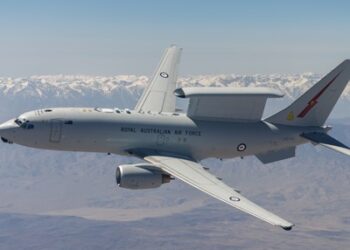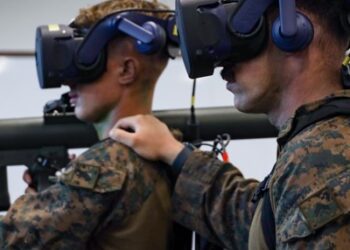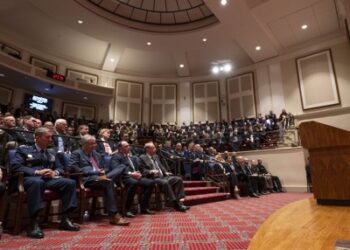**JOINT BASE PEARL HARBOR-HICKAM, Hawaii** — The U.S. Navy’s top officer emphasized the critical need to expand the nation’s shipbuilding capacity and output. Adm. **Daryl Caudle**, the chief of naval operations, noted the unprecedented alignment among Congress, the administration, the defense secretary, the Navy secretary, and the Navy itself, all focused on this goal.
In his first overseas trip as chief of naval operations, Caudle visited **South Korea**, **Japan**, and **Guam** before concluding in Hawaii. During his time in South Korea, he toured **HD Hyundai Heavy Industries** and **Hanwha Ocean** shipyards to explore how U.S. partners can enhance shipbuilding efforts. Caudle articulated the importance of collaborating with allies, saying, “There’s so much capability there, that we need to partner with them, in the U.S. and in their own country.”
He acknowledged the long-standing decline in U.S. shipbuilding capabilities, stating, “We’re behind in shipbuilding—that’s atrophied over decades in the United States.” He emphasized the strategic significance of shipbuilding for global presence and national defense. Despite the strong support from leadership, he stressed that “building ships is not a light switch,” acknowledging the complexities involved in constructing high-end ships.
In addition to shipbuilding, Caudle pointed out the necessity of ensuring the Navy can effectively operate with its existing resources. He mentioned working closely with the heads of the **Pacific Fleet** and **Indo-Pacific Command** to optimize current capabilities.
Further, Caudle recognized the importance of cultivating a well-trained workforce in shipbuilding and maintenance. He highlighted issues with attrition, stating, “Attrition is a problem. So when I have double-digit attrition, that’s a challenge for me. We need to get in single-digit attrition.” He also stressed that even a skilled workforce would struggle without adequate supply chain resilience.
Choosing the Pacific region for his inaugural overseas trip, Caudle mentioned its significance, underscoring that it is the “most important region… second to defending our homeland.” He identified three of the four primary threats facing the U.S. in the Indo-Pacific—namely **China**, **Russia**, and **North Korea**. Caudle remarked, “Anyone who’s ever been in my seat is never comfortable with where we stand,” as threats continue to evolve and require sustained military readiness.











![Russia-Ukraine and Israel-Hamas Wars Expose the Global Nature of [Cyber] Conflicts](https://globaldefense.online/wp-content/uploads/2024/02/Global-cyberwar-120x86.jpg)

